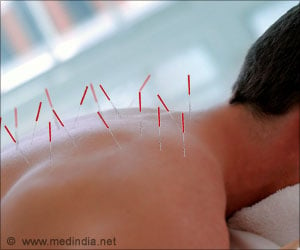A new study has claimed that when compared to placebo, the pain relieving effects of acupuncture are limited and seem to lack clinical relevance.
A new study has claimed that when compared to placebo, the pain relieving effects of acupuncture are limited and seem to lack clinical relevance.
For the study, the researchers at the Nordic Cochrane Centre in Copenhagen examined evidence from thirteen acupuncture pain trials, which involved over 3,000 patients, reports the British Medical Journal.The trials compared three arms of treatment (real acupuncture, placebo or ’pretend’ acupuncture or no acupuncture) for a broad range of common conditions such as knee osteoarthritis, migraine, low back pain and post-operative pain.
To minimise bias, the researchers even considered differences in study design and quality before the analysis.
The researchers found a small analgesic effect of real acupuncture compared to placebo acupuncture, which was equivalent to a reduction in pain levels of about 4mm on a 100mm pain scoring scale.
A 10mm reduction on this scale is classed as ’minimal’ or ’little change’ so the apparent analgesic effect of acupuncture seems to be below a clinically relevant pain improvement, say the authors.
They found a moderate difference between placebo acupuncture and no acupuncture (10mm on a 100mm pain scoring scale), but the effect of placebo acupuncture varied considerably.
Advertisement
The authors could not explain this variation, but they did not find an association between the type of placebo acupuncture and its effect.
Advertisement
They further added that their findings also question both the traditional foundation of acupuncture and the prevailing theory that acupuncture has important effect on pain in general.
They believe that future research should focus on comparing acupuncture with best existing treatments for different conditions.
The research, titled ’Acupuncture treatment for pain; Systematic review of randomized clinical trials with acupuncture, placebo acupuncture and no acupuncture groups’ is published on bmj.com.
Source-ANI
SRM









